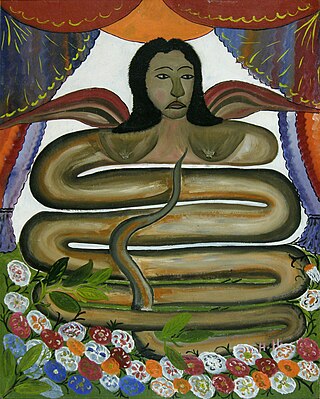
Lwa, also called loa or loi, are spirits in the African diasporic religion of Haitian Vodou. They have also been incorporated into some revivalist forms of Louisiana Voodoo. Many of the lwa derive their identities in part from deities venerated in the traditional religions of West Africa, especially those of the Fon and Yoruba.

Melilla is an autonomous city of Spain in North Africa. It lies on the eastern side of the Cape Three Forks, bordering Morocco and facing the Mediterranean Sea. It has an area of 12.3 km2 (4.7 sq mi). It was part of the Province of Málaga until 14 March 1995, when the Statute of Autonomy of Melilla was passed.

Rastafari, sometimes called Rastafarianism, is a religion that developed in Jamaica during the 1930s. It is classified as both a new religious movement and a social movement by scholars of religion. There is no central authority in control of the movement and much diversity exists among practitioners, who are known as Rastafari, Rastafarians, or Rastas.
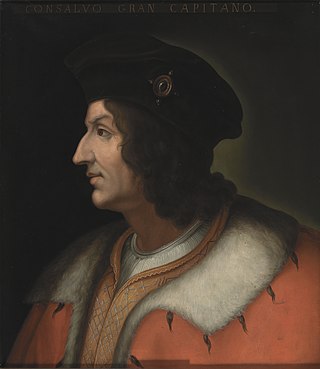
Gonzalo Fernández de Córdoba was a Spanish general and statesman who led successful military campaigns during the Conquest of Granada and the Italian Wars. His military victories and widespread popularity earned him the nickname "El Gran Capitán". He also negotiated the final surrender of Granada and later served as Viceroy of Naples. Fernández de Córdoba was a masterful military strategist and tactician. He was among the first Europeans to introduce the successful use of firearms on the battlefield and he reorganized his infantry to include pikes and firearms in effective defensive and offensive formations. The changes implemented by Fernández de Córdoba were instrumental in making the Spanish army the dominant force in Europe for more than a century and a half. For his extensive political and military success, he was made Duke of Santángelo (1497), Terranova (1502), Andría, Montalto and Sessa (1507). In Italian history he is remembered as Consalvo Ernandes di Cordova, il Gran Capitano.
Ifá is the native knowledge and belief system of the Yoruba. The practice of Ifá by them predates historical records. Before the colonial period, the Yorùbá developed practices and institutions that make Ifá revolve around the reality of Yorubaland, and how the human inhabitants relate with that reality. The system of divination used in Ifá is a code to accessing the scientific and metaphysical knowledge in the literary corpus; the Odu Ifá. Orunmila is identified as the Grand Priest, as he revealed the foundational divinity and prophecy to the world. A Babalawo or Iyanifa are called priests of Ifá, but really, they are scholars; the equivalent of professors in classical university systems. They use either the divining chain known as Opele, or the sacred palm or kola nuts called Ikin, on the wooden divination tray called Opon Ifá to mathematically calculate which Odu to use for what problem.
Obeah, or Obayi, is a series of African diasporic spell-casting and healing traditions found in the former British colonies of the Caribbean. These traditions derive much from traditional West African practices that have undergone cultural creolization. There is much regional variation in the practice of Obeah, which is followed by practitioners called Obeahmen and Obeahwomen.

Leandro Fernández de Moratín was a Spanish dramatist, translator and neoclassical poet.
Palo, also known as Las Reglas de Congo, is an African diasporic religion that developed in Cuba during the late 19th or early 20th century. It arose through a process of syncretism between the traditional Kongo religion of Central Africa, the Roman Catholic branch of Christianity, and Spiritism. Initiates in the religion are termed paleros (male) or paleras (female).
Kumina is an Afro-Jamaican religion. Kumina has practices that include secular ceremonies, dance and music that developed from the beliefs and traditions brought to the island by Kongo enslaved people and indentured labourers, from the Congo region of West Central Africa, during the post-emancipation era. It is mostly associated with the parish of St. Thomas in the east of the island. However, the practice spread to the parishes of Portland, St. Mary and St. Catherine, and the city of Kingston.

Haitian Vodou is an African diasporic religion that developed in Haiti between the 16th and 19th centuries. It arose through a process of syncretism between several traditional religions of West and Central Africa and Roman Catholicism. There is no central authority in control of the religion and much diversity exists among practitioners, who are known as Vodouists, Vodouisants, or Serviteurs.

Edward Davis or Davies was an English buccaneer active in the Caribbean during the 1680s and would lead successful raids against Leon and Panama in 1685, the latter considered one of the last major buccaneer raids against a Spanish stronghold. Much of his career was later recorded by writer William Dampier in A New Voyage Round the World (1697).
Antihaitianismo, also called anti-Haitianism in some English sources, is prejudice or social discrimination against Haitians in the Dominican Republic.

Determining the boundaries between the continents is generally a matter of geographical convention. Several slightly different conventions are in use. The number of continents is most commonly considered seven but may range as low as four when Afro-Eurasia and the Americas are both considered as single continents. An island can be considered to be associated with a given continent by either lying on the continent's adjacent continental shelf or being a part of a microcontinent on the same principal tectonic plate. An island can also be entirely oceanic while still being associated with a continent by geology or by common geopolitical convention. Another example is the grouping into Oceania of the Pacific Islands with Australia and Zealandia.
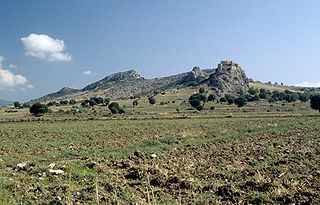
Castabala, also known as Hieropolis and Hierapolis was a city in Cilicia, near the Ceyhan River.
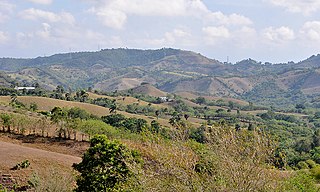
Baitoa is a municipality in the Santiago Province of the Dominican Republic. Santiago is part of the northern valley of the country, otherwise known as the Cibao. Baitoa is named after a native tree, also known as St. Domingo Boxwood. Baitoa was formerly known as Sabana de los Burros. The population speaks a Cibao dialect of Dominican Spanish.

Santería, also known as Regla de Ocha, Regla Lucumí, or Lucumí, is an African diasporic religion that developed in Cuba during the late 19th century. It arose through a process of syncretism between the traditional Yoruba religion of West Africa, the Catholic form of Christianity, and Spiritism. There is no central authority in control of Santería and much diversity exists among practitioners, who are known as creyentes ("believers").
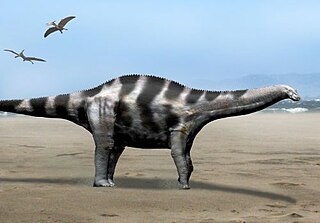
Demandasaurus is a genus of rebbachisaurid sauropod dinosaur from early Cretaceous deposits of Spain. Demandasaurus is known from an incomplete but associated skeleton that includes cranial and postcranial remains. It was collected from the Castrillo de la Reina Formation in Burgos Province of Spain. It was first named by Fidel Torcida Fernández-Baldor, José Ignacio Canudo, Pedro Huerta, Diego Montero, Xabier Pereda Suberbiola and Leonardo Salgado in 2011 and the type species is Demandasaurus darwini.

The Pongo River or Rio Pongo is a river that flows into the Atlantic Ocean near Boffa, Guinea. Its source is located in Fouta Djallon. The surrounding area has also been known as "Pongoland" or "Bongo Country". The estuary has been designated as a Ramsar site since 1992.
Mestizo Colombians refers to Colombians who are of European and Amerindian ancestry.













